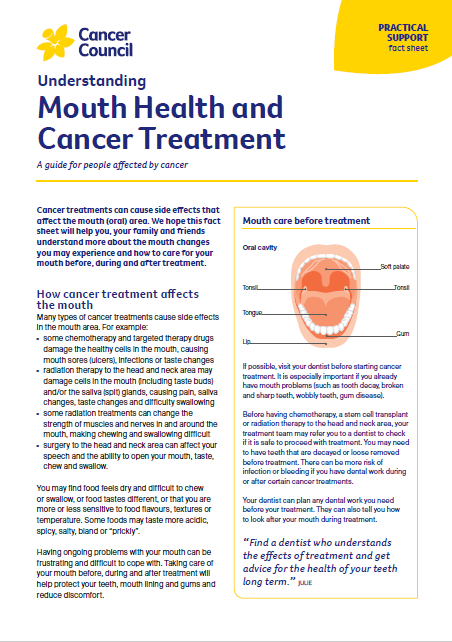- Home
- About Cancer
- Living well
- Nutrition and cancer
- Treatment side effects and nutrition
- Chewing and swallowing problems
Chewing and swallowing problems
Chewing and swallowing involve your lips, teeth, tongue and the muscles in your mouth, jaw and throat working together. Surgery to the jaw, mouth or throat areas can cause swallowing difficulties. Radiation therapy can also make chewing and swallowing hard. These changes are usually temporary, but can sometimes be permanent.
Problems chewing
People with dentures who lose weight may find their teeth become loose. Treatment for head and neck cancer sometimes involves removing teeth. Both of these things can make it hard to chew.
Difficulty swallowing
If you’re having difficulty swallowing (dysphagia), you may need to change the consistency of food by chopping, mincing, pureeing or thickening it (see this sample menu for ideas).
Signs that the texture of food is causing problems include:
- taking longer to chew and swallow
- coughing or choking while eating or drinking
- feeling like food or drink is going down the wrong way
- food sticking in your mouth or throat like a ball
- throat clearing after meals.
A speech pathologist can assess how your swallowing is working, and a dietitian can suggest ways to make sure you are getting enough nutritious food.
Feeding tubes
Severe swallowing problems can make it hard to eat and drink. You may need a feeding tube until swallowing gets easier. This will help you meet your nutrition needs. A feeding tube is rare for most people with cancer, but is more of a possibility with cancers affecting the head and neck, stomach, oesophagus or lung. If a feeding tube is required, your treatment team will discuss this with you.
For more on this, see Head and neck cancer and Stomach and Oesophageal cancer.
→ READ MORE: Ways to change the texture of foods
Video: Eating well after a cancer diagnosis
Podcast: Meditation and Relaxation
Listen to more of our meditation and relaxation podcast for people affected by cancer
Jacqueline Baker, Senior Oncology Dietitian, Chris O’Brien Lifehouse, NSW; Lauren Atkins, Advanced Accredited Practising Dietitian, OnCore Nutrition, VIC; Dr Tsien Fua, Head and Neck Radiation Oncology Specialist, Peter MacCallum Cancer Centre, VIC; Rosemerry Hodgkin, 13 11 20 Consultant, Cancer Council WA; Clare Hughes, Manager, Nutrition Unit, Cancer Council NSW; John Spurr, Consumer; Emma Vale, Senior Dietitian, GenesisCare, SA; David Wood, Consumer.
View the Cancer Council NSW editorial policy.
View all publications or call 13 11 20 for free printed copies.
